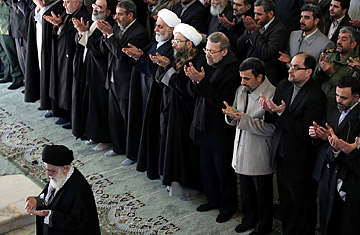
From friends to foes. Ahmadinejad's attempt to promote civilian, Islamist prerogatives at the expense of the clergy's authority ran afoul of Khamenei, the theocracy's Supreme Leader.
The invective and the encomiums from the white-bearded speaker echoed almost like ritual as thousands of Iranians gathered at Tehran University on Feb. 3 for a Friday prayer marking the 33rd anniversary of the country's Islamic revolution. Supreme Leader Ayatullah Ali Khamenei, who has presided over such ceremonies for 23 years, railed against threats from Israel and the U.S. and praised the country's nuclear program, all to the thundering approval of the masses below his podium.
Then his speech took an unexpected turn toward the parliamentary elections coming up on March 2. "Officials shouldn't be fooled by the conspiracies of the enemy," Khamenei said ominously. "Those people who don't receive votes should be careful that they don't get duped like the candidates who didn't receive votes in [the 2009 presidential elections]. All the candidates and their supporters are responsible for ensuring security when faced with enemy plots." This wasn't a threat directed at the opposition Green movement, which has been largely sidelined, with its leaders under house arrest and hundreds of supporters behind bars. By warning against a repeat of the protests that followed the 2009 vote, Khamenei was taking aim at his once favorite political son, President Mahmoud Ahmadinejad, who betrayed no emotion as he sat with dignitaries in the front row of the crowd.
As the U.S. and its allies increase pressure on Iran to freeze its nuclear program, the upcoming elections in the Islamic Republic are revealing a domestic political struggle that may have an impact on the way Tehran goes about dealing with its foreign adversaries. On one side is Khamenei, who is ruthlessly consolidating power; on the other is Ahmadinejad, who after years of anti-Western militancy stands as an unlikely advocate of peaceful engagement with the U.S. The urgency over Tehran's nuclear ambitions grew on Feb. 22 when inspectors for the International Atomic Energy Agency abruptly ended their tour of Iran after the government denied them access to a military site and refused to clarify the military dimensions of their nuclear program.
Few are betting on Ahmadinejad. Says Karim Sadjadpour of the Carnegie Endowment for International Peace: "Iran has become a one-party system, the party of Khamenei, [and] the most important qualification for aspiring members of parliament in Iran is obsequiousness to the Supreme Leader." But a critical sector of Tehran's power structure is showing signs of restiveness: the Revolutionary Guards Corps, the dominant military force in the country, some 120,000 strong, which happens to oversee vast business interests. Though the corps is not monolithic, it has been supportive of Khamenei since he assumed the role of Supreme Leader in 1989. Now, however, some Guards commanders, faced with biting new international sanctions, are increasingly critical of Khamenei's brinkmanship. If Ahmadinejad and his allies somehow win a majority in the 290-seat parliament, the beleaguered President could once again try to chip away at Khamenei's authority, perhaps even advocating radical policy goals like dialogue with the U.S. or more-transparent nuclear negotiations.
